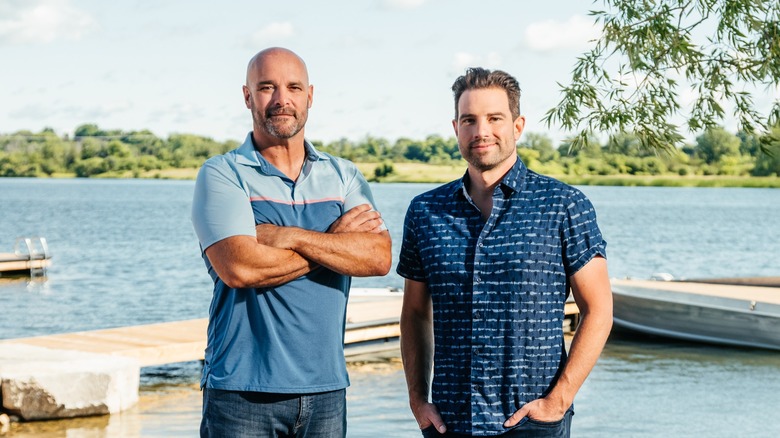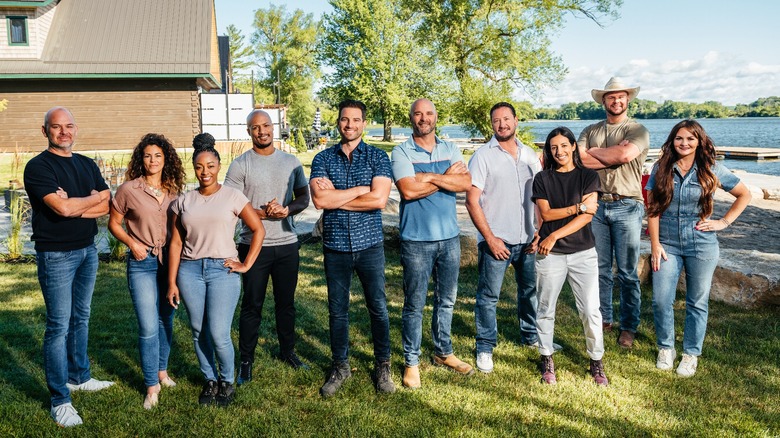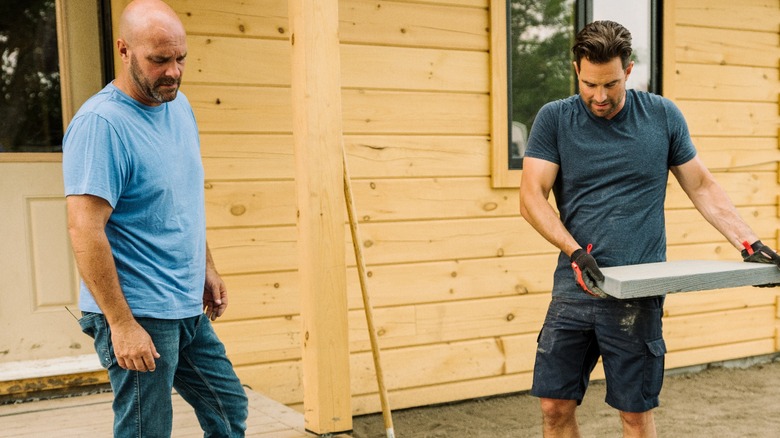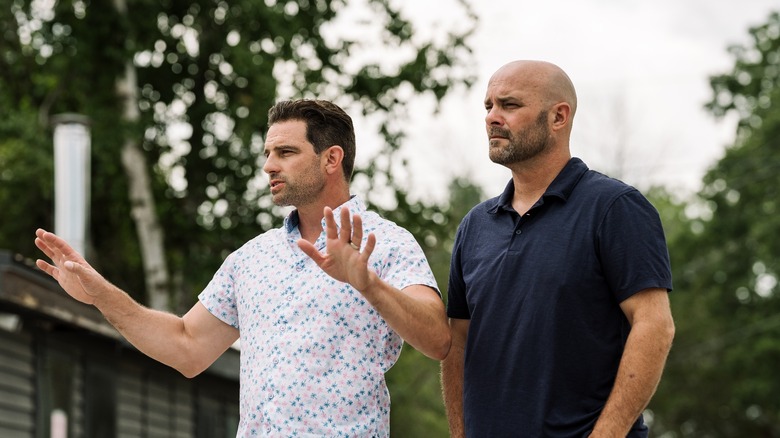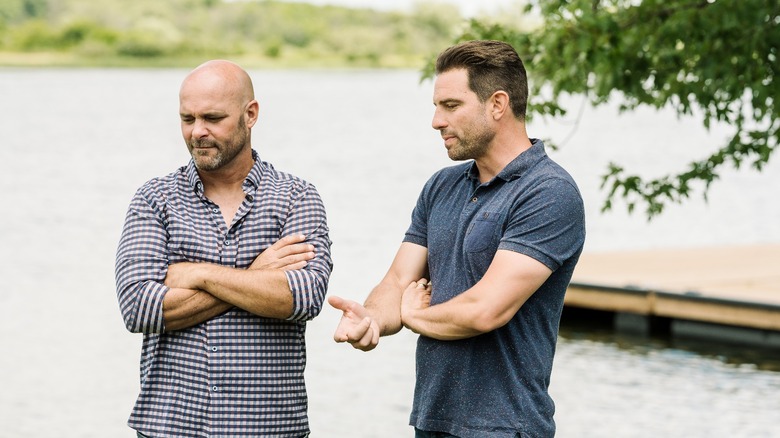Renovation Resort Showdown's Scott And Bryan On Renovating An Oasis - Exclusive Interview
Scott McGillvary and Bryan Baeumler know how to create an investment property; however, the two approach them differently. Scott often thinks about the features that will help boost a homeowner's return on investment, while Bryan focuses on the quality of the build. Together, the two make the perfect pair, both as the ideal home designers and as co-hosts on HGTV's "Renovation Resort Showdown." The new competition show features designer and contractor pairs who are renovating cabins at a lakeside resort and competing to win a grand prize of $100,000. Scott McGillvary and Bryan Baumler host, looking for unique features that will help crown a winner.
While the two may vary when it comes to their renovation philosophy, they come together to helm the competition. They each look for something that makes the designers and contractors stand out, ultimately finding a winner who really was "the best overall." In an exclusive interview with House Digest, Scott McGillvary and Bryan Baeumler discuss the show, the details they notice in a renovation, what they see for the future of the housing market, and ways that future homeowners can get creative with their homeownership.
Renovating resorts takes a completely different mindset
"Renovation Resort Showdown," it's a new unique design show since its focus is on vacation properties rather than residential properties. Can you tell me some of the differences between renovating for rental use versus residential use?
Scott McGillvary: [T]here's a big difference between planning and executing a residential renovation versus a vacation property renovation or resort. With a space like this, the first thing was to assess what it was versus what we were transforming it into. This was an existing, hundred-year-old family fishing lodge that has become quite dilapidated.
The first thing we did is look at the demand for waterfront properties in this area and the type of amenities that would be required. When planning for a recreational property like this, you want to lean into the vacation mode that people are going to be in. You can go a little overboard on your themes and on your concepts and on the opulence, because it's somewhere [that] people are looking to get out of a residential feel and get into something that allows them to take both a physical and mental break from their lives.
We pushed the competitors to think and consider, "What is the theme of the property? Is it going to be Mediterranean? Is it going to be a beach house?" [We wanted to] make sure that it's obvious for people when they arrive.
I don't think that people are going to see theme homes as much as we do with these vacation properties, but we did encourage everybody to go slightly over the top in order to attract people from their residential homes to try something different.
Can you tell me some of the details that you were looking for in the vacation homes as you were judging them?
Bryan Baeumler: Scott and I, both in being construction and renovation investment, we're looking for quality of work, down to the slightest detail. These are properties that'll go on the market to be rented, so it can't be a DIY basement. The competitors were very skilled in design and construction, which was great, but they were under some significant timeline challenges.
We're looking for quality of work. We're looking for a cohesive design that works throughout, a theme that they can carry throughout, and detail of the design. It's got to be a comfortable property that renters can come in and use immediately. It had to be functional, too.
Get inspired by vacation properties for your own home
Bryan, you're not a stranger to renovating resort properties; you've had many shows on HGTV doing just that. What are some things that people can put into their homes to make it feel like a resort?
Baeumler: Outdoor living is a big thing that people are putting in ... Outdoor living spaces, a little bit of whimsy. As Scott had mentioned, you can go a little more overboard on a rental property or vacation property with design, but there's no reason why you can't create theme zones in your own home.
During the pandemic, people were looking to change the use of their home or to maximize the use of their home. We saw schoolrooms being put in, office spaces being built, spas being built, gyms. It would give people the amenities of a resort or travel right at home.
With those outdoor spaces, we're seeing pools and sun shelves and outdoor entertainment playgrounds so people can enjoy more of a staycation at home as well.
Scott, your expertise is in renovation and investment properties. Is there one detail that homeowners can add to get the best return on their investment?
McGillvary: The main focus of these properties, in general, is to find that balance between how much you're putting in and what your rental rates are going to be or your appraised value at the end. When we look at a vacation property and return on investment, the first thing we're going to look at is, what are the things that are going to have the greatest impact on your rental rate?
On these properties specifically, we're working with the competitors to make sure they're taking into consideration the curb appeal and the shore appeal, because those are the first two things that guests are going to be looking at when they're making a decision as to where they're going to go.
What does the waterfront look like? Do I feel excited to arrive at this property? We also know that, in the real estate investment space, that curb appeal is the first deciding factor in which people either fall in love with a property or hate a property. So, it is that first impression, it is that cover of the book. That's something that we're going to see further down the road in this series: how much work goes into the exterior.
[There are] also these profit maximizers that we look at with investment properties. On a rental property, for instance, something like having a hot tub or a sauna will give you a competitive advantage over other rental properties. It'll also increase the nightly rates and increase the season in which people are willing to rent a property.
[There are] a lot of decisions that our competitors are going to have to make along the way to decide where they invest their money and what's going to give them the best value.
Homeownership is going to be the best feature
You just mentioned curb appeal. Do you have any tips that people can use to boost their curb appeal in their own homes?
McGillvary: Absolutely. I would say start with the front door. The front door can create a lot of energy, it can create a sense of calmness. It's the first thing that people touch when they arrive to a property.
You're going to want to look at the hardware on your door. You want to put a door light in there. Look at the color. Sometimes a coat of paint, something simple like that, can change the entire energy of that front door. Everything around it — the steps, the numbers, the lighting, all that hardware in that area — that would be the simplest and first place I would advise somebody to concentrate their efforts on. Looking at the bigger picture, having a consistency with the rest of the exterior — what's the field color of the property, the accent color of the property, and what's your trim color? Typically, if you can find harmony with those three variations, you can create the perfect curb appeal.
Is there a feature or a trend that you think all homes should have right now?
Baeumler: Boy, [there are] a lot of features homes should have right now. It's a tough market. We're heading back to the feudal system where more and more properties ... I think they're estimating in the next five years, up to 45% of residential properties will be commercially owned.
The biggest feature people can have now is home ownership, beating down that mortgage and increasing the equity. Scott made an interesting point. When people drive up, they tend to see the curb appeal and they tend to value that the most, but that's very similar to the relationship between Scott and I. They get there and they want to see the pretty things, but at the end of the day, the real value is in the structure and how solid the building is. Right, buddy?
McGillvary: Yeah, that's pretty straightforward. You want the property to be safe. Echoing what Bryan said, one of the other big trends that we're seeing in the real estate space is monetization opportunities and co-ownership. With housing prices where they are in North America and the competitiveness of home ownership, we're seeing people get really creative. It's important for the next generation of homeowners and first-time home buyers to start to think outside the box. "What is a financially stable way for me to own a home? Is it as a partner? Is it having a rental suite in there, or a vacation property?"
Bryan and I look at a lot of different types of vacation properties as well. It's nice to have a vacation property, but it's even better if you can afford it. [We're] giving people ideas on how they can use the property and also have guests, paying guests, come in to use it when they're not there. It's really all about maximizing space. The future is maximizing space and use of properties. Only build as much as you need. Bring in other owners or shared ownership, if required, to be financially stable. If you're not fully using a property, is there an opportunity to monetize it through a rental platform?
Baeumler: You're seeing more and more multifamily housing. That goes to Scott's point — multi-generation, multifamily, get a property purchased and paid for, get enough equity to finance the second property and move ahead. The ability to afford it, number one, the ability to monetize it, and the ability to use the equity in that property to accrue more properties is key. That's a bigger feature than having a hot tub or a back deck.
Creative design still catches eyes
About the show, was there a favorite space that was designed in any of the homes?
Baeumler: Episode 1 has aired [in the U.S.]; the competitors shocked and surprised us at every turn. There were some amazing design details in rooms that some of them — initially, we walked in, and Scott and I looked at each other and thought, "Oh, boy. This isn't going to end well," and they ended up being our favorite spaces.
There were some creative ideas and themes that went on in the show. I would take a little piece of each house together, but it wouldn't be a very cool cohesive design, but there was some really cool elements in all of the houses.
McGillvary: Without giving away too many secrets about what's to come, each one of these properties, at one point, shocked me with the design choices. There's one kitchen in particular that, to this day, I still wake up in the middle of the night and I'm like, "Did that really happen?"
[There are] a couple features that were new to me, things I had never seen, didn't know they existed. I don't want to [spoil] anything, but with the loft spaces that they designed, [there is] some serious creativity. There's definitely one that stands out above all the rest in terms of those spaces. Overall ... towards the end of the series, what swayed our decisions is seeing how it all comes together. Sometimes, looking at these vacation properties one room at a time, it can be quite polarizing. It's about who can pull it all together at the end.
So, yes, there is a favorite, and you'll see, because somebody wins $100,000 in this show, and it's not because it was our favorite, it's because it really was the best overall. In every episode, what's great is that you get to see who came in and took the lead that week, and it moves around quite a bit. [It's] a little early to give away all of the reveals, but every week there is a favorite and, at the end, one winner.
New episodes of "Renovation Resort Showdown" air Sundays 9:00 p.m. ET on HGTV and are available to stream on MAX.
This interview has been edited for clarity.
